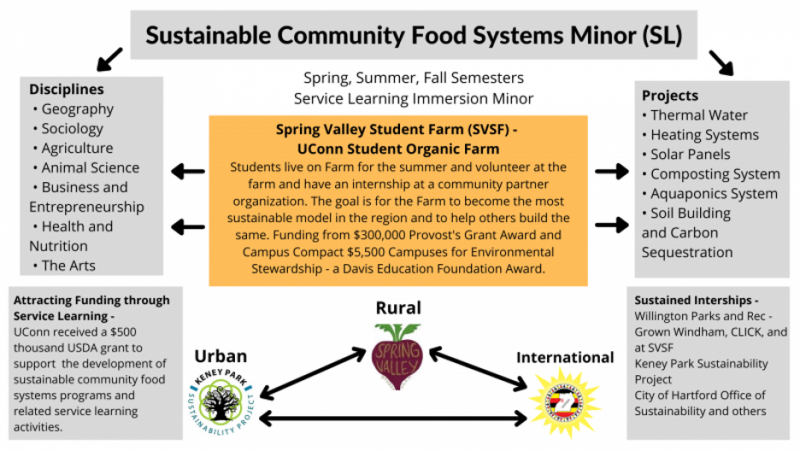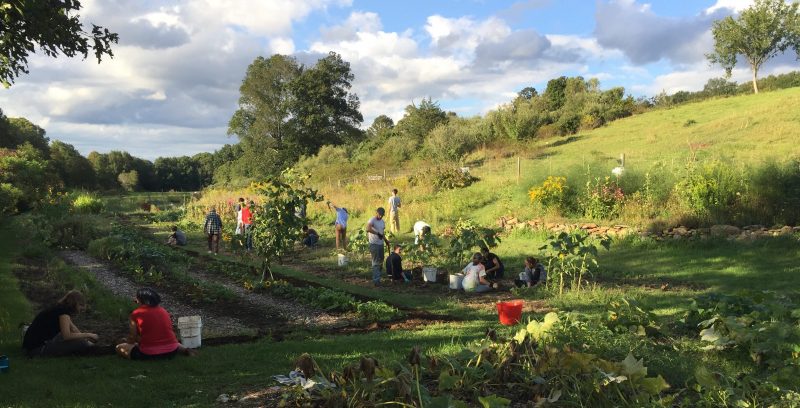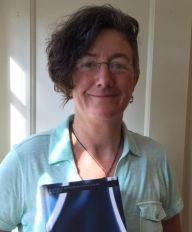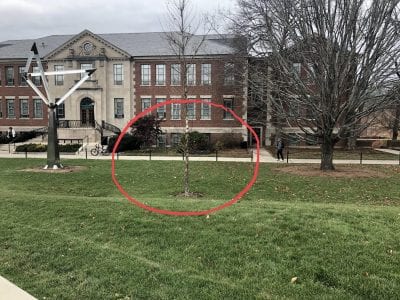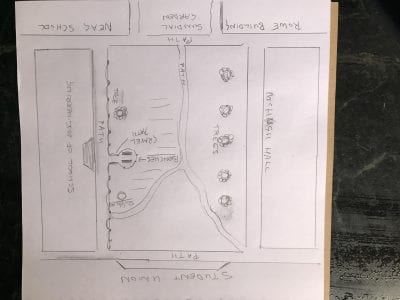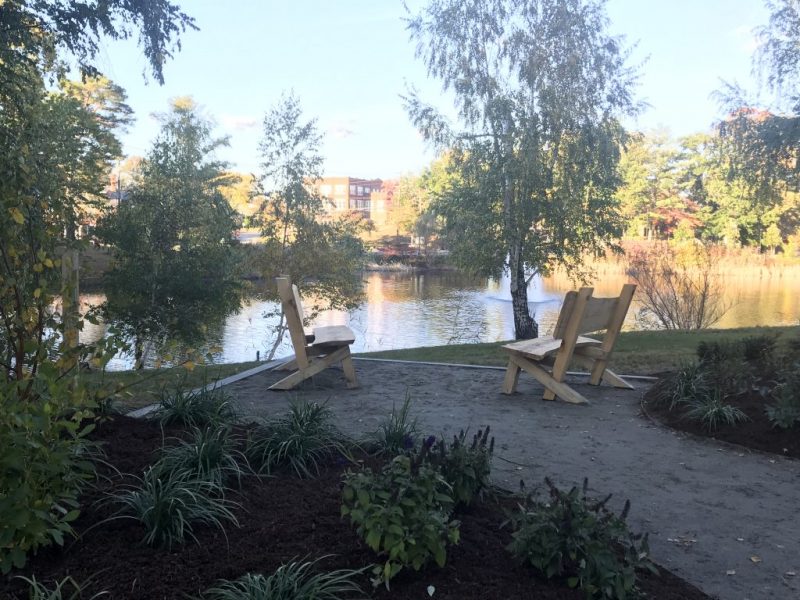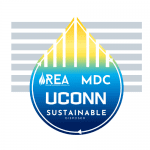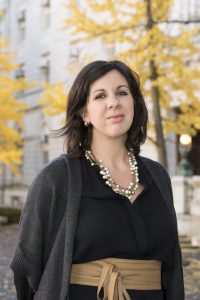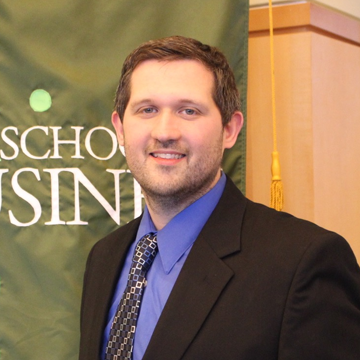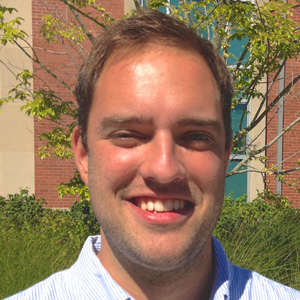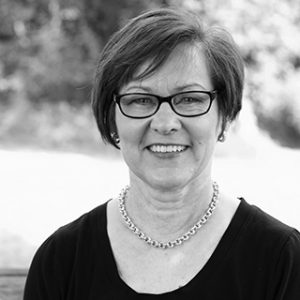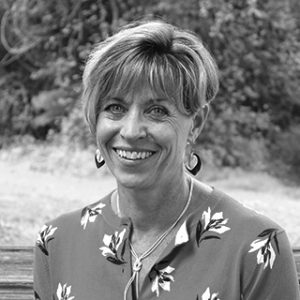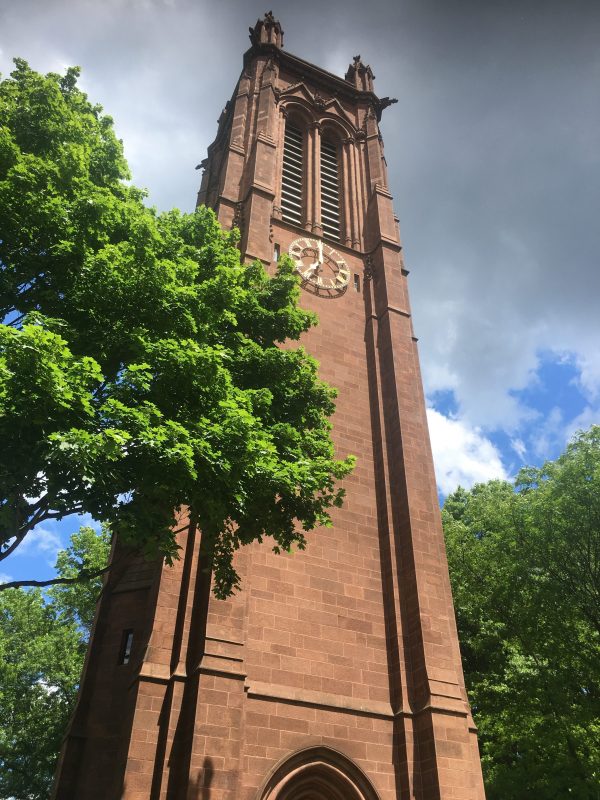
Sustainable Community Food Systems (SCFS) is a minor in Environmental Studies created in partnership with UConn Service Learning and offered through the College of Liberal Arts & Science. SCFS, is an innovative, immersive academic program with an emphasis on the intersections of food sustainability, environmentalism, and social justice.

The SCFS minor curriculum is comprised of 3 components that could be done in three semesters:
- In your first semester with SCFS, you will participate in component one of the minor. Component one is a theoretical basis for the food system including social and economic aspects of the food system taking two classes such as 2705 Sociology of Food (could also take NUSC 3230 or its pre-requisite), and a course in food production (SPSS 2500E).
- That summer, you will have the opportunity to participate in an Experiential Learning Semester. This means you will work in food production at a farm or community garden, engage in an intensive internship with a community partner, and earn a student intern stipend. We suggest working with our Spring Valley Student Farm!
- After your experiential learning semester, you will continue your intensive internship with your community partner for credit by signing up for a (6) credit internship through Sociology, Geography, or CAHNR. During the fall, you will be able to take ARE 3260, ARE 4438, NRE 3265, SPSS 2100, SPSS 3610. You will also bring together the work you have done in a class where you research the academic side of your internship and build your portfolio to complete your minor.
This is a curriculum outline, but we are happy to work with your needs and interests as a student to build a curriculum that is tailored to you!
Procedure for Declaring and Completing a Minor:
- Review the minor requirements in the catalog or plans of study.pdf.
- Meet with the minor advisor, listed in each plan of study below.
- Declare the minor online through the CLAS Online Program Change or by turning in the paper plan of study to Young
- Work with minor advisor to complete minor requirements.
- Apply for graduation in StudentAdmin.
- Submit final plan of study online for the minor when submitting major final plan of study.
Interning with Sustainable and Community Food Systems: https://sl.engagement.uconn.edu/scfs-internships/
Interning with UConn Extension: https://soapbox.uconn.edu/public/storyView.php?id=112527&cid=74&iid=14351#

- Sustainable Community Food Systems offers you a unique opportunity to connect theory and practice through classroom-based work with service learning and hands-on experiences in the local community. Focusing specifically on the issues of food sustainability, environmentalism, and social justice, you will gain vital skills that will enable you to become a leader in society’s slow and contentious, but ongoing, shift to a more equitable, just and sustainable future
- At the heart of the Sustainable Community Food Systems minor is an intensive internship (16-20 hours per week) with a single community partner that is part of the food system. Over the course of the summer and fall, you will gain practical experience through over 450 hours of paid and credit-bearing internship. This experience is then critically analyzed through an intersectional lens on the complexities of the entire food system that will become a part of your written portfolio. This portfolio, plus your internship hours, will reflect the summation of your work.

- Sustainable Community Food Systems minor will give you skills to help solve humanity’s most pressing problems. This minor will allow you to learn how to be system thinkers looking at the big picture solutions of how transforming the food system is a platform for creating an equitable, humane and sustainable society. You will discover how your actions can enable you to advocate for a more resilient and just food future. For example, you may choose to advocate for food security in just and culturally appropriate ways and/or learn how to innovate as a social entrepreneur towards a more sustainable food system.

“18 credits total”
| Course | Pre-Requisites | Semester Offered | Credits |
| (2 Electives)SOCI 2705– Sociology of Food,
ARE 3260– Food Policy, ARE 4439, NRE 3265– Sustainable Urban Ecosystems, NUSC 3230– Community Nutrition |
NUSC 2200– Nutrition and Human Development (for NUSC 3230) | Fall (ARE)Spring (SOCI) | 6 credits |
| Capstone Sem./Thesis (e.g. GEOG 4000W) | 3 credits | ||
| Approved Internship | 6 credits, Service Learning | ||
| (1 food production elective)SPSS 2100 – Environmental Sustainability of Food Production in Developed Countries,
SPSSE 2500 – Principles and Concepts of Agroecology, SPSS 3610 – Organic and Sustainable Vegetable Production |
Spring (SPSSE 2500) | 3 credits |
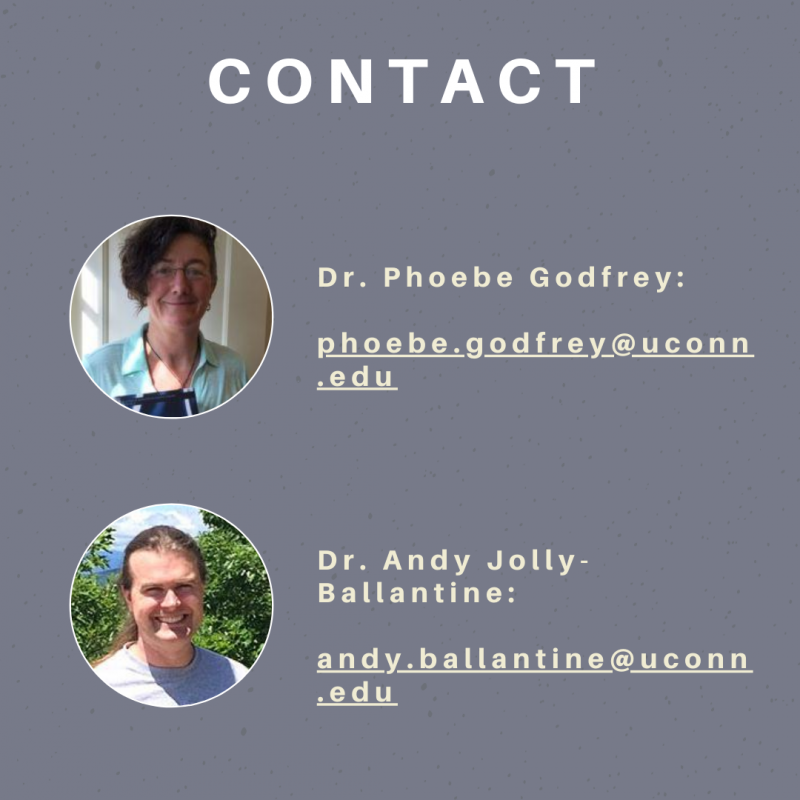
“Sustainable Community Food Systems offers students who are motivated to get out of the ‘classroom box’ an innovative opportunity to learn creative critical thinking skills, as well as hands-on engagement with our local food system. Such an opportunity will give students a leg-up in terms of working in the emerging and ever-growing food, sustainability, and social justice movements”
– Phoebe Godfrey
“Few issues illustrate the merging of sustainability, practical human needs, local action, and equity in the way food does. in this program, you will learn all aspects of sustainability, social, economic, and environment, through hands-on experience and self-directed study. From food production to social action to sustainable technology, you will make a difference in the local community and develop social entrepreneurship skills that you can carry to any endeavor in your future career.”
-Andy Jolly-Ballantine
Join Rural Semester!
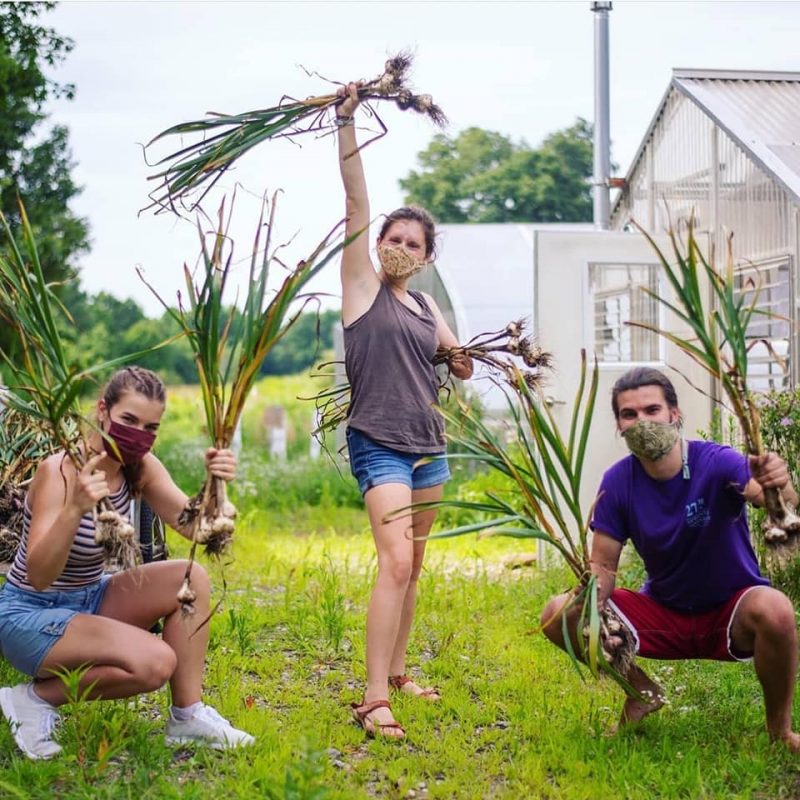

A major/minor in Environmental Studies, including the Sustainable Community Food Systems minor, can lead to a career in a variety of fields, including public policy, environmental education, eco-tourism, marketing or consulting, journalism, or advocacy. The interdisciplinary skills one will obtain, help tailor your experience to the career path you wish to follow.
Farming Programs
- Farm & Food Jobs ; Job postings that connect people, farms and food.
- NOFA MASS ; Farming jobs in Massachusetts
- WWOOF ; a worldwide movement linking volunteers with organic farmers and growers to promote cultural and educational experiences based on trust and non-monetary exchange, thereby helping to build a sustainable, global community.
- Young Farmers Coalition ; Envision a country where young people who are willing to work, get trained and take a little risk, can support themselves and their families in farming.
Federal Services
- AmeriCorps VISTA ; Volunteers in Service to America build stronger communities and help eradicate poverty through their programs
- ResiliencyCorps ; (A sub of AmeriCorps) Increase the resiliency of communities for individuals and for the community as a whole
- FoodCorps ; Connects to kids to healthy school in food through service learning, so they can lead healthier lives.
- PeaceCorps ; Provides service opportunities to immerse oneself in a community abroad, working side by side with local leaders to tackle the most pressing challenges of our generation.
Organizations
- Civil Eats – daily news source for critical thought about the American food system.
- Detroiters for Environmental Justice – Mission is local and national collaboration to advance environmental justice and sustainable redevelopment. They’re also a part of the Detroit Youth Climate Summit and have several local campaigns.
- Environmental Law & Policy Center : Public advocacy & environmental progress
- Food & Water Watch; Working closely with grassroots allies and national partners, we work to protect our food and water by standing up to corporations that put profits over people.
- GrowWindham; Community garden program whose focus is on growing youth, growing food, growing community. Provides internships, volunteering & jobs
- Jobs with Justice; Unions rights organization
- REAL School Gardens ; Programs empower teachers, in low income communities, to lead engaging experiential lessons outdoors. REAL-world hands-on lessons accelerate learning and help students build a strong foundation for long-term academic success.
- The Nature Conservancy ; Impact conservation in 72 countries and in all 50 states, with priorities in challenges facing lands, waters, oceans, cities and climate.
Job Posting Sites & Other Resources
Tailor these sites to your needs using keywords like sustainability, environmental policy, environmental journalism, food systems, farms, community gardens, or scroll down their compiled list of job opportunities and guides on careers
- Environmental Career ;
- Good Food Jobs ; Designed to link people looking for meaningful food work with the businesses that need their energy, enthusiasm, and intellect.
- Green Collar Blog ; Provides news and reosurc on green collar jobs
- Grace News ; Offers a guide for jobs in food sustainability on their EcoCentric blog site.
- Green Jobs ;
- Indeed ; Search uses keywords & possible location
- Idealist ; Search uses keywords. Connects idealists with opportunities for action and collaboration all over the world
- North American Association for Environmental Education ; The hub for environmental education professional development.
- Simply Hired ; Search uses keywords & possible location
- Sustainability Leads ; Full time job postings
- Third Sector New England ; Partners in social change.
- Net Impact ; Search uses keywords & possible location
- USA Jobs ; Search uses keywords & possible location
Want to learn more?
- Civil Eats – A daily news source for critical thought about the American food system.
- Grace Links ; Highlights the connections among food, water and energy, promoting a sustainable future. Educational articles.
- Mother Jones ; A daily news source
- Join a local food-coop!
- WIllimantic Food Coop ; Willimantic, CT
- Fiddleheads Food Coop ; New London, CT
- Support local food system and sustainability endeavors!
- CLiCK Willimantic; Mission is to grow the vitality of our economy and community by offering shared use commercial kitchens to farmers and culinary entrepreneurs seeking to create food-based businesses; and to improve the health of our local community by teaching gardening, culinary arts, nutrition, and other food-related classes.
- GrowWindham; Community garden program whose focus is on growing youth, growing food, and growing community. Provides internships, volunteering & jobs.

“For me, learning is the process of incorporating something new into my self – into my mind, my heart, and the way I see the world around me. It demands that I am intimately involved with what I’m learning. “Experiential learning” is another word for the same thing, and Sustainable Community Food Systems will give me that opportunity. As a current Spring Valley farmer, I can say that almost all of my true learning happens here at the farm already.” ~Jessica L.W.
“Sustainable Community Food Systems was an experience that I pursued because I was curious about life on the farm and about the local food systems that UConn was involved in. By digging in, and getting involved, I developed not only new skills, but also connections to my fellow student farmers that offered new perspectives on local food systems and sustainability. We all learned from each other, not just from a lecture, and the process was fun! If you’re interested in collaborative and hands on learning then Sustainable Community Food Systems is definitely the place for you”. ~Alana D.
Figure – Conceptual model of the SL Sustainable Community Food Systems Minor.
